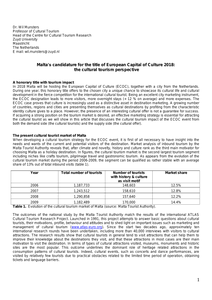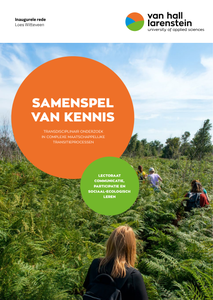Introductie: De Festival Atlas 2018 geeft een overzicht en analyse van het landschap van film-, food-, kunst- en muziekfestivals in Nederland in 2018. Dit landschap is voortdurend aan verandering onderhevig: festivals worden groter, verdwijnen of er komen nieuwe bij. Zonder kaart is het makkelijk verdwalen.
MULTIFILE

De veelheid aan verschillende festiviteiten en evenementen roept de vraag op of deze veelheid zich laat opdelen in verschillende categorieën zodat we beter kunnen duiden wat bijvoorbeeld een festival is. We voelen aan dat een bruiloft, carnaval, de WK finale Rugby, een TeDtalk en het Sziget festival naast overeenkomsten ook verschillen kennen. In ieder geval gelden er andere regels over hoe we ons (moeten) gedragen en wat we mogen verwachten. Maar wat zijn die overeenkomsten en verschillen dan precies? Het antwoord op deze vraag helpt om preciezer te kunnen aangeven waar uitspraken in artikelen en boeken betrekking op hebben: een bewering doen over de toename over de jaren van het aantal festivals vereist wel dat we weten waarover we praten.
MULTIFILE
De Festival Atlas: Filmfestivals 2017, geeft een overzicht en analyse van het landschap van filmfestivals in Nederland in 2017. Informatie over hoeveel festivals er waren, hoeveel filmprijzen er werden uitgereikt, welke social media werd ingezet en de verschillen tussen provincies is hierin terug te lezen
LINK
An overview and analysis of the food festivallandscape in The Netherlands in 2017
LINK
Een systematiek en een verdere afbakening. Data verzamelen over social media activiteiten van festivals.
LINK
Voor de registratie van de onderzoeksdata is in 2015 een relationele database ontwikkeld met de naam Festivalmonitor. In deze blog de belangrijkste entiteiten in deze onderzoeksdatabase.
LINK
De kandidatuur van Malta als Europese Culturele hoofdstad in cultuurtoeristisch perspectief
DOCUMENT

Inaugurele rede uitgesproken bij de aanvaarding van het ambt van lector Loes Witteveen aan Hogeschool Van Hall Larenstein, 14 maart 2024. Het lectoraat Communicatie, Participatie en Sociaal-Ecologisch Leren (CoPSEL) werkt aan maatschappelijke vraagstukken rondom natuurlijke en sociale duurzaamheid, werkt sector- en discipline overstijgend met een centrale rol voor communicatie, participatie en leren.
DOCUMENT

Onderzoeker Philip Marcel Karré bespreekt twee recente rapporten die sociale innovatie in de stadslandbouw belichten. De auteurs beschrijven en analyseren Rotterdamse projecten vanuit twee resp. invalshoeken: als burgerinitiatief in de buitenruimte en als sociale onderneming, en schetsen zo een beeld van de stand van zaken in de praktijk.
LINK
This article analyzes how a city can generate instrumental, intrinsic, and institutional value from its event-related networks and platforms, based on the Hieronymus Bosch 500 program in the Dutch city of ‘s-Hertogenbosch (Den Bosch). Interviews with key stakeholders traced program dynamics over more than a decade to reveal processes of network and platform development, encapsulated in a conceptual model of strategic value creation. The results indicate that networks served to generate flows of resources, while programming helped develop platforms for knowledge generation and dissemination, helping to focus attention on the city. The Bosch 500 Foundation managing the program played an effective role in developing and supporting networks, which in turn generated significant short-term instrumental and intrinsic value. However, the failure to establish a sustainable city-wide platform related to the Bosch program caused institutional value destruction, which many saw as a missed opportunity. The study of networks and platforms can benefit from a longitudinal approach as well as a broader, contextual view of event networks.
MULTIFILE